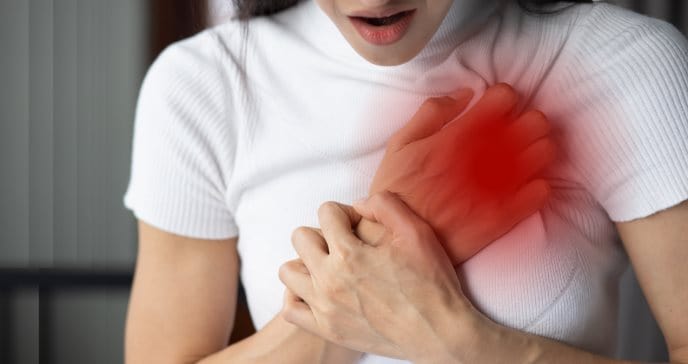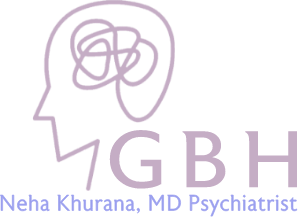
- October 9, 2025
Can Anxiety Cause Chest Pain? What You Need to Know
Chest pain is one of the most alarming conditions affecting people of every age group. More than 20% of people experience severe chest pain during their lifetime. This may be due to panic attacks or heart-related issues.
Anxiety is a common mental health condition that can trigger chest discomfort and related symptoms. So, can anxiety cause chest pain? To find the answer to this confusion, we’ll explore how anxiety affects the body, why it leads to tightness in the chest, and how to distinguish it from heart-related issues. Let’s dive in!
What is Anxiety and How Does it Affect the Body?
Anxiety is a common medical condition caused by excessive worry or fear about a future event. It’s the body’s natural response to stress. In many situations, this response can be helpful, as chronic anxiety and chest pain activate the fight-or-flight response, keeping the body in a constant state of alertness. This can benefit you when in dangerous situations. However, excessive anxiety and worrying can be cause for concern.
Over time, chronic anxiety and chest pain can become closely linked, affecting not only your mental health but also your heart health. This ongoing tension leads to several physical symptoms of anxiety, including:
- Rapid heartbeat
- Shortness of breath
- Sweating and trembling
- Tightness in the chest
- Dizziness
- Fatigue
Why Does My Chest Feel Tight? Causes Related to Anxiety
Anxiety can cause chest pain due to the release of stress hormones. This type of stress-induced chest pain is not dangerous by itself, but it can lead to more serious conditions when ignored. Due to the confusion in the symptoms, at times, many people wonder, Why does my chest feel tight during anxiety? Several mechanisms explain why this happens:
- Stress hormones
- Muscle tension
- Hyperventilation
- Increased heart rate
- Nerve sensitivity
- Adrenaline surge
- Shallow breathing habits
- Excessive focus on symptoms
What Do Symptoms of Anxiety Chest Pain Feel Like?
Unlike heart disease, anxiety-related pain often appears suddenly during periods of worry, stress, or a panic attack chest pain episode. Symptoms of anxiety chest pain vary from person to person, but some common sensations include:
- Sharp, stabbing pains in the chest
- Persistent chest heaviness
- Irregular heartbeat
- Dizziness, excessive sweating, dry mouth
- Shortness of breath
- Trembling
- Difficulty concentrating
- Emotional changes
- Insomania
One Conversation Can Change Everything! Consult Dr. Neha Khurana for Expert Help on Anxiety and Chest Pain Relief
Chest Pain Anxiety vs Heart Attack
Here’s a simple comparison to distinguish anxiety symptoms from a heart attack:
| Feature | Anxiety Chest Pain | Heart Attack |
| Onset | Sudden, often during stress or panic | Sudden and gradual, can occur anytime |
| Duration | Minutes to hours, may come and go | Vary in every patient, intensify over time |
| Location | Can shift, anxiety, chest pain location varies (center, sides, sharp spots) | Central chest may flow towards the left arm, jaw, and back |
| Relief | Improves with relaxation, breathing exercises for chest tightness | No relaxation with any exercise, immediate transfer to emergency hospital |
| Accompanied by | Fear, sweating, rapid breathing | Nausea, cold sweats, severe fatigue |
How to Relieve Chest Tightness and Pain From Anxiety?
If you’re searching for ways to relieve chest tightness from anxiety, the following techniques may help:
- Breathing exercises for chest tightness
- Grounding techniques
- Gentle movement
- Mindfulness and meditation
Treatment of Anxiety Chest Pain
Managing chest pain from anxiety involves treating the underlying anxiety disorder. Options include:
- Cognitive Behavioral Therapy (CBT)
- Regular exercise
- Prioritize sleep
- Medications
- Lifestyle changes
- Stress management practices
- Yoga or journaling
- 3-3-3 rule (name 3 things you see, 3 things you hear, and move 3 parts of your body to ground yourself in the moment)
Conclusion
So, can anxiety cause chest pain? Absolutely. The tightness, heaviness, or stabbing sensations you feel can be triggered by stress and anxiety. However, because chest pain is also a hallmark of heart disease, it’s essential to take it seriously. Maintaining a healthy lifestyle, using therapy, following relaxation techniques, and other suggestions shared in this piece improve your mental well-being and protect your overall health.
FAQs
How to relieve chest tightness?
Practice deep breathing, relaxation exercises, or light stretching to ease anxiety-related tightness.
Why does my chest feel tight?
Chest tightness often occurs due to muscle tension, hyperventilation, or increased heart rate linked to stress and anxiety.
Can anxiety cause chest pain every day?
Yes. People with chronic anxiety and chest pain may experience daily episodes, especially under constant stress.
Can stress and anxiety cause chest pain?
Yes. Stress-induced chest pain is one of the most common physical symptoms of anxiety.
Can anxiety cause sharp chest pain?
Yes. Anxiety can cause stabbing or sharp pains, especially during panic attacks.
How to relieve chest tightness from anxiety?
Breathing exercises, grounding techniques, and mindfulness practices can help.
Can anxiety cause chest pain?
Yes, anxiety is a well-documented cause of chest pain, though it’s important to rule out heart disease.
How long does anxiety chest pain last?
It can last minutes to several hours, but typically improves once anxiety decreases.
How to reduce anxiety naturally?
Exercise, meditation, healthy sleep habits, journaling, and reducing caffeine or alcohol can all help manage anxiety.
